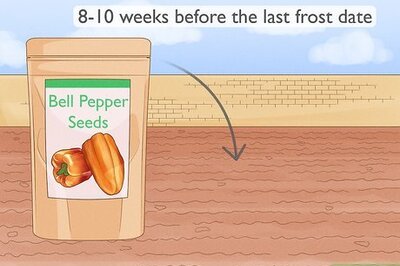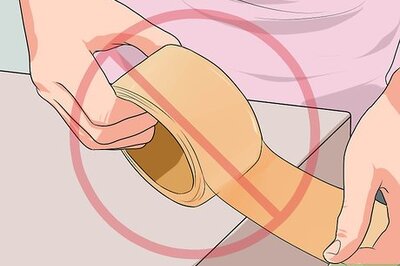
views
- Check for pooling water, sinkholes, or cracks in your pavement to find the leak. A professional can use gas or noise loggers to find the exact location.
- Shut off your main water supply and watch your water meter. If it still increases, you've got a leak.
- If there’s a sudden increase in your water bill, a moldy/mildewy smell around the property, and/or low water pressure, there’s a good chance you might have a leak.
Locating an Underground Water Leak

Shut off your main water supply and see if the meter increases to confirm a leak. Turn off all faucets and water-using appliances. Locate the main water shut-off, which may be outside near the edge of your house, along the same path as your water meter. Take note of where the sweep hand is on your water meter’s register. Turn off the valve and wait for 30 minutes to an hour. Check the new meter reading—if there’s an increase, you've got a leak. If your water meter box is constantly filled with water, you might have a leak at your water meter. Newer meters may have leak detectors you can check. Depending on the brand of your water meter, there may be a small white, red, or blue triangle or a small silver wheel that rotates when water flows through the meter. If the leak detector is spinning even when everything in your home is turned off, it’s a good chance that you have a leak. The dial face is divided into 100 increments around the outer edge. One complete revolution of the hand equals about 1 cubic foot of water or about 7.5 gallons.

Check for disturbances above ground. It’s common for underground leaks to cause damage to the ground above them. If underground leaks are surrounded by earth or grass, you may notice sinkholes, damp spots, or increased vegetation in your yard. If there’s concrete around the leak, you might notice cracked areas, bulges, or potholes. You might also notice warping or shifting in your sidewalk or walkway. Sinkholes can be dangerous, especially if they grow too big, causing flooding and other damage to your home and property. If the wet spots are near your home, act immediately to avoid damage to your house’s foundation that could weaken its structure. Find a certified plumber right away. If you suspect that a water leak is underneath a concrete slab on a building, call a professional to determine exactly where the leak is. It may be necessary for them to repipe the area above the floor and leave the old pipe underneath to avoid breaking the floor.

Use thermal imaging to find leaky pipes. Use an infrared camera to look for moisture underneath the surface of your property, which can indicate a leak underground. An infrared camera can detect changes in temperature, which can help pinpoint exactly where the leaks are to minimize unnecessary digging on your property. Look for areas underneath your house or land that are colder or hotter than the rest of the surrounding area—this could be where your leak is.

Call a professional to locate and fix the leak if needed. In some cases, it might be necessary to call a plumber or engineer to find the exact location of the leak. A professional might use the following techniques to find where the leak is underground: They might use acoustic leak detection. Plumbers or engineers can use an acoustic listening stick to try and determine where a leak may be. They might also use noise loggers, which attach magnetically to key junctions, main valves, or hydrants. Using ultra-sensitive microphones, loggers use sound waves to help locate leaks in water distribution systems. They may use trace gas to find the leak. Using trace gas is a non-toxic method that doesn’t cause harm to the pipework or the surrounding environment. It works by pressurizing the gas through pipes, which forces it through to the surface, where it escapes and can be detected using a gas detector.
Signs of an Underground Water Leak

There’s a sudden increase in your water bill. A surge in your water usage could be a sign that there’s a leak somewhere on your property. Has your bill changed drastically in the past few weeks or months? Have you been paying more without a significant change in your daily routine? If so, you may have a leak in your pipework.

There’s an unpleasant smell around your property. If undetected leaks are left for a long enough period, the water can cause mildew or mold, which can result in an unpleasant smell in the area. If you smell an odor around your kitchen sink or toilet, it may be a sign that you have a cracked pipe underneath your home.

Your water pressure is low. If you notice that the pressure of your faucets is lower than usual, you may have a water leak somewhere on your property. If this is the case, you can do a quick leak check by turning off all of the fixtures in the house and turning one on. If the pressure is higher than it was, you might have a leak. Pipes that are clogged, eroded, or ruptured can also cause low pressure in your water supply. Make sure to check your water meter and check for other signs of underground leaks to make sure that that is the problem.

You hear sounds from the pipes. Although sounds from a water leak aren’t usually used to find underground water leaks, they may help you narrow down the location of the leak. Focus on the area with the loudest sound, and listen for any of the following: Hissing sounds can mean that there’s been a decrease in the pipes’ water pressure. Splashing can be a sign of water flowing around the pipe. Clinking can be from pebbles, stones, or other sediment flowing and banging into the pipes.

There’s rust, dirt, or air in the water supply. Underground leaks can suck sediments from the surrounding environment, making the water from your faucets appear dirty, rusty, or bubbly. This can also be a sign of other plumbing issues. If you see rust, dirt, or air combined with one of the other above signs, then you may have an underground water leak.
What causes water leaks?

Water leaks can be caused by chemicals, pipe erosion, or natural changes. Most of the time, leaks in underground pipes are caused by aging, general wear and tear, or changes in the environment. Here are some of the most common causes of plumbing leakage: Over a large amount of time, chemicals from the water or the soil can cause underground pipes to erode, leading to cracks or holes. Natural disasters can also cause water leaks. Earthquakes and tremors in the ground can put pressure on pipework that can cause them to move and crack. General wear and tear can also damage your pipes. Older buildings and homes might have older pipework, which over time can rust and crack, leading to leaks. Above ground, rapid temperature changes can cause pipes to expand and contract, which can crack the pipework. Construction or overgrowth might also unintentionally damage your pipes. Sometimes when trees grow close enough to the pipes, it can damage them and result in leakages.




















Comments
0 comment